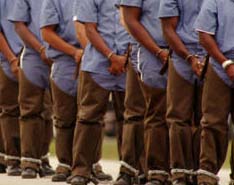 When I tell people about China's Laogai, often the first question people ask me is "What's wrong with prison labor?" Many people say that prisoners ought to labor, either as punishment or to pay for the cost of their imprisonment, and point out that the U.S. allows prison labor. I recently read a blog post arguing that prison labor would be a better deterrent to crime than just prison. Usually I respond by saying that prison labor in the U.S. is different from prison labor in China--working conditions in the Laogai are appalling, prisoners are forced to work, are not compensated for their work, and if they don't meet their production quotas prisoners are often beaten or have their meals withheld. So although the U.S. allows prison labor, it is very different from prison labor in China. Even so, there are some fundamental problems with prison labor in general that are worth pointing out.
When I tell people about China's Laogai, often the first question people ask me is "What's wrong with prison labor?" Many people say that prisoners ought to labor, either as punishment or to pay for the cost of their imprisonment, and point out that the U.S. allows prison labor. I recently read a blog post arguing that prison labor would be a better deterrent to crime than just prison. Usually I respond by saying that prison labor in the U.S. is different from prison labor in China--working conditions in the Laogai are appalling, prisoners are forced to work, are not compensated for their work, and if they don't meet their production quotas prisoners are often beaten or have their meals withheld. So although the U.S. allows prison labor, it is very different from prison labor in China. Even so, there are some fundamental problems with prison labor in general that are worth pointing out.
Prison labor, particularly unpaid prison labor as they have in China, creates problems for those who wish to keep prison populations small and minimize arbitrary or unnecessary detention, and for those who believe in free markets with true competition. To the first point, a system in which the government stands to profit from imprisoning its people provides a perverse incentive for that government to continue to imprison more and more people. Many U.S. states already have prison labor, and, in fact, the five states with the highest incarceration rates as of 2007 (Louisiana, Mississippi, Texas, Oklahoma, and Alabama, respectively) all have active prison labor programs. (This fact also discredits the deterrent argument.) To be fair, the state with the lowest incarceration rate, Maine, also allows prison labor, so it is ambiguous whether the U.S. use of prison labor contributes to our notoriously high incarceration rates, but the connection should at the very least give us pause. (More after the jump)
Another problem with prison labor, in China or the US, is that it takes jobs away from law-abiding citizens. Prisoners are often paid below the prevailing wage, and do not require health benefits, making them substantially cheaper to employ. A bill was brought before the Texas Senate this year to reform prison labor laws precisely because prison labor in the state is taking jobs away from law-abiding Texans who are already suffering in the economic downturn. So even though it sounds nice to say that prisoners should work to earn their keep, it doesn't really make sense when that means taking jobs away from ordinary citizens.
All of that being said, I am certainly not opposed to work programs that are voluntary, are aimed at rehabilitation (and specifically at reducing recidivism rates), that do not profit the government, and that do not take jobs away from law-abiding citizens. Does Chinese prison labor meet these standards? Absolutely not. Does American prison labor? I'm no expert on U.S. prisons, and it depends on the state, but there are certainly some questionable programs out there. Of course, even the worst of U.S. prison labor programs is nothing close to the egregious human rights abuses that occur inside China's Laogai on a daily basis.